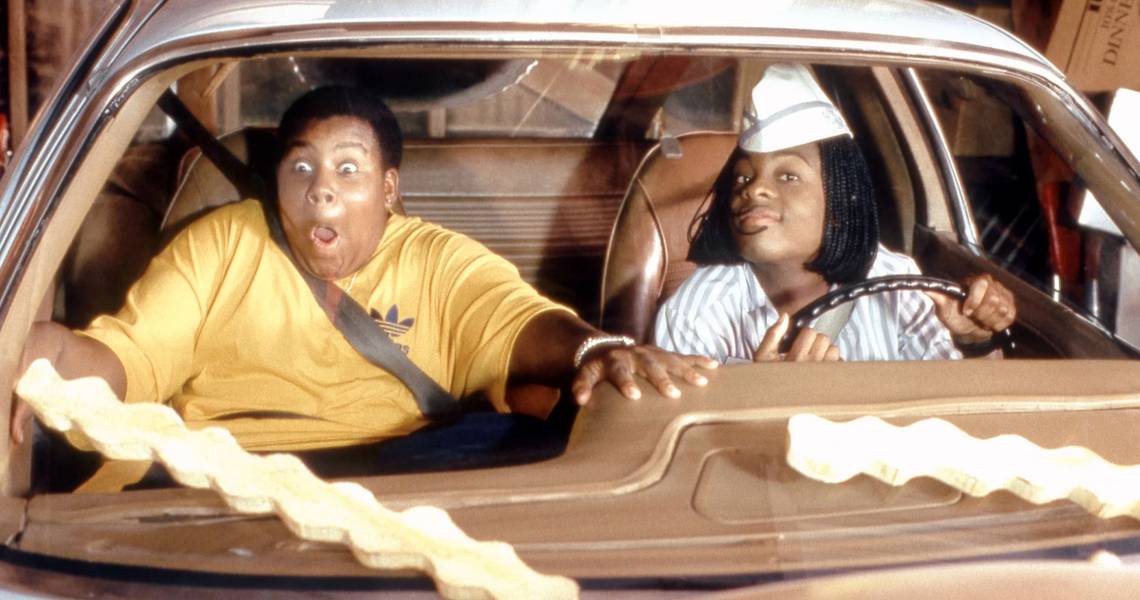When Nickelodeon Movies was unleashed in the summer of 1996 with Harriet the Spy, an adaptation of the revered 1964 novel by Louise Fitzhugh, the studio received top billing. The film’s official one-sheet positioned Nickelodeon as the film’s main attraction, rather than lead actress Michelle Trachtenberg, co-star Rosie O’Donnell, director Bronwen Hughes, or Fitzhugh herself. Nickelodeon’s cultural currency with the nation’s youth meant it could option a thirty-year-old novel, adorn it with its trademark neon orange “splat” logo, and have it result in a modest box office success for distributor Paramount Pictures. Leaving popular and younger-skewing intellectual properties like Rugrats and Doug on the backburner for future feature film adaptations, Nickelodeon opted to capitalize on the tween audience that had grown up with its brand at home in years prior and released their undisputed masterpiece, Good Burger, in the summer of 1997.
Like films adapted from Saturday Night Live in the same decade, Good Burger originates from a popular sketch comedy routine, which was culled from Nickelodeon’s weekly series All That (1994 - 2005). Good Burger starsKeenan Thompson and Kel Mitchell as Dexter and Ed, respectively. They are two teens working at a local burger shop named Good Burger that is facing closure in the wake of the new, seemingly Xanadu-themed fast food restaurant that opens across the street: Mondo Burger. While Dexter and Ed wear old-timey pinstripes evocative of a 1950s burger stand, the conniving villains behind Mondo Burger dress in silver and blue polyester suits that look like futuristic athleisure. The ultimate catalyst for rivalry between both burger shops comes in the way of a special sauce that Ed concocts—succinctly referred to as “Ed Sauce”—which leads the duo on a rambunctious series of events that includes a brief stint in a mental ward (featuring a cameo by George Clinton and a requisite musical number), a slapstick game of mini-golf with Carmen Electra, and a climax featuring chemically-altered burgers that grow to massive proportions and explode, covering everything in goopy burger excess.
Good Burger is anything but subtle, living up to the Nickelodeon name and the legacy of unruly teen movies. It’s clear Nickelodeon’s sophomore feature shares a lot in common with the teen-targeted comedies of the 1970s than the decade it hails from. The influence of Rock ‘N’ Roll High School (1979) and Cooley High (1975) is pervasive, not only in Good Burger’s noted irreverence, but in how these characters navigate the trials of coming-of-age, including Dexter’s comments about having an absent father. These moments are potent callbacks to a time when social issues were trojan-horsed into popular entertainment for young people, perhaps most evident in John Waters’s Hairspray (1988) the previous decade. At face value, Good Burger is about spending your summer vacation working with your friends, riding around in the Burger Mobile, and finding romance. But under its goofy exterior, there’s a resoundingly anti-capitalist message and an inherent distrust in American fast food. This makes the fact that Good Burger was released by a major studio and targeted at the very people most likely to beg and plead for their parents to take them to McDonald’s, which is to say kids, extremely shocking.. It’s not only one of the all time great children’s films, but one of the great fuck you statements to corporate American culture.
Good Burger screens at 10AM, 1PM, and 4PM both Saturday, June 15, and Sunday, June 16, at the 4 Star Theater.




